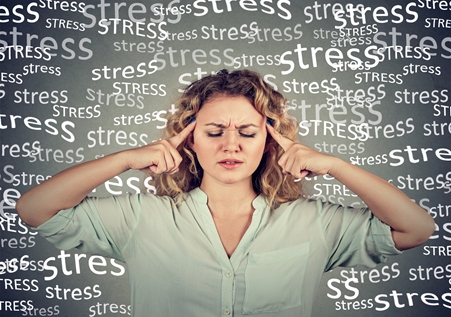Are You Stressed Out? Why Stress is a Beauty Buster

Stress- We all have it but some of us deal with it better than others. If you look at any recent United States President from their first day in office until their last, you will see that all aged appreciably in only four years. Why? Because carrying the weight of the world on their shoulders took its toll on their appearance. Even if you’re just an everyday lady boss or Mom trying to make her way in the world, stress can cause you to age before your time. Here’s how and why according to New York Neuropsychologist Dr. Sanam Hafeez.
Dr. Hafeez says that, “Aside from the unattractive scowl that stress brings to the face, it creates direct physiological changes. Stress is defined as the reaction of the body to a stressor or stimulus that causes stress. Stress can be acute, which affects the body in the short term, or chronic, affecting the body in the long term. Synonyms for stress include anxiety, nervousness, apprehensiveness, impatience, fear and restlessness.”
Dr. Hafeez explains that, “Stress that is not controlled most certainly affects the body’s physical characteristics or beauty. It affects skin, hair, fingernails, digestion and sleep patterns. Stress-induced conditions include hair loss, heart disease, obesity, obsessive-compulsive disorder, sexual dysfunction, tooth and gum disease and ulcers or indigestion.”
Some Common Symptoms of Stress Induced Beauty Busters
Under-Eye Bags:
Tomorrow’s to-do list can weigh on your mind, keeping you from getting enough beauty sleep. This can cause fluid to pool below your lower eyelid area. What you end up with is a puffy mess in the a.m. Stomach sleepers, bad news: You can expect the puffiness of your under-eye bags to be even worse because of gravity.
Flushed Face:
“When you’re stressed, you breathe in short, shallow breaths and can even find yourself holding your breath for periods of time, which can lead to flushing and redness,” says Dr. Hafeez.
Hair loss:
Stress can trigger alopecia areata, which causes patches of baldness anywhere on the body, including on your head. Stress can also trigger a tick where you pick at head hairs out of bad habit. This condition is called trichotillomania. Usually, this hair can grow back. But it doesn’t even have to fall out in the first place: Pay close attention to your own habitual responses to daily stress, to avoid similar sparseness.
Gray Hair:
Hair can also age prematurely due to stress. If you are genetically predisposed to have premature gray hair, stress will further decrease your production of melanin, easily increasing the number of gray or white hairs. By increasing your consumption of biotin, protein, and vitamin E you can reduce these negative effects to keep your hair strong and youthful.

Pimples:
When you are stressed, it alters your hormones. It increases cortisol production, which in turn increases the oil production in your skin. All of this leads to greater odds of clogged pores. Stress can also multiply the number of acne-causing bacteria in the body, which might require a high-dose antibiotic prescription from your dermatologist.
Mini Menopause:
Dr. Hafeez says this isn’t proven, but some believe increased levels of the hormone cortisol can cause a dip in estrogen that’s similar to the decrease during menopause. Less estrogen means less collagen production which can leave your skin dull and dry.
Wrinkles:
Anxiety, crying, feeling down and a lack of sleep can cause deeper lines around the eyes, forehead, eye area and mouth.
Dark Circles:
Stress can break the fragile capillaries under your eyes, leaving you with under-eye rings and a tired appearance.
Lines on the fingernails:
The appearance of vertical lines on your fingernails is fairly common and is related to both the natural aging process and nutritional deficiencies. But when they extend from the cuticle to the tip of the nail, it’s a clear sign that your stress is having an effect on the body.
Weight Gain:
Most of us become overeaters when we’re feeling a lot of pressure. This happens thanks to your fight-or-flight response, a.k.a. survival mode. Once your body reaches a certain stress level, it does what it feels it needs to. In most cases, that means overeat. Why? “Because your body thinks you’ve used calories to deal with your stress, even though you haven’t, says Dr. Hafeez. She adds, “As a result, it thinks you need to replenish those calories, even though you don’t.” Levels of “the stress hormone,” cortisol, rise during tension-filled times. This can turn your overeating into a habit. Because increased levels of the hormone also help cause higher insulin levels, your blood sugar drops and you crave sugary, fatty foods.
How Can We Mitigate Stress ?
Countless books and articles have been written about dealing with stress. Dr. Hafeez explains that, “The first step is recognition. To help deal with your stresses, write down a list of what you are most worried about before any event, or what chronically causes worry in your life.
Identifying your stressors is the first step in managing them. If you are chronically late or find that it hard to get organized, figure out what you do that makes you late or disorganized. Write it down and acknowledge it. Then you can come up with a plan to preemptively tackle what may drive you and your loved ones into a stressed-out situation.”
Another trick in dealing with the pressures of life is plain old reasoning and the realization that you cannot control everything. Sometimes we trap ourselves into worrying about things that we have no control over, and recognition of that fact can reduce stress immeasurably.
About the Doctor:

Dr. Sanam Hafeez PsyD is a NYC based licensed clinical psychologist, teaching faculty member at the prestigious Columbia University Teacher’s College and the founder and Clinical Director of Comprehensive Consultation Psychological Services, P.C. a neuropsychological, developmental and educational center in Manhattan and Queens.
Dr. Hafeez masterfully applies her years of experience connecting psychological implications to address some of today’s common issues such as body image, social media addiction, relationships, workplace stress, parenting and psychopathology (bipolar, schizophrenia, depression, anxiety, etc…). In addition, Dr. Hafeez works with individuals who suffer from post-traumatic stress disorder (PTSD), learning disabilities, attention and memory problems, and abuse. Dr. Hafeez often shares her expertise to news outlets in New York City and frequently appears on CNN and Dr.Oz.
Connect with her via twitter @comprehendmind. Alternatively, her website is www.comprehendthemind.com.



